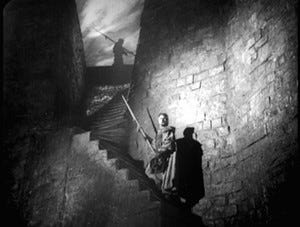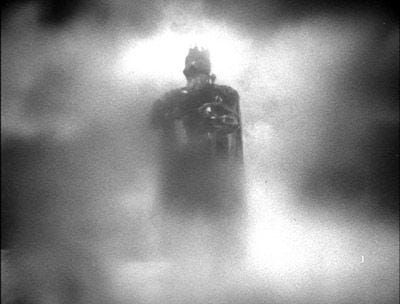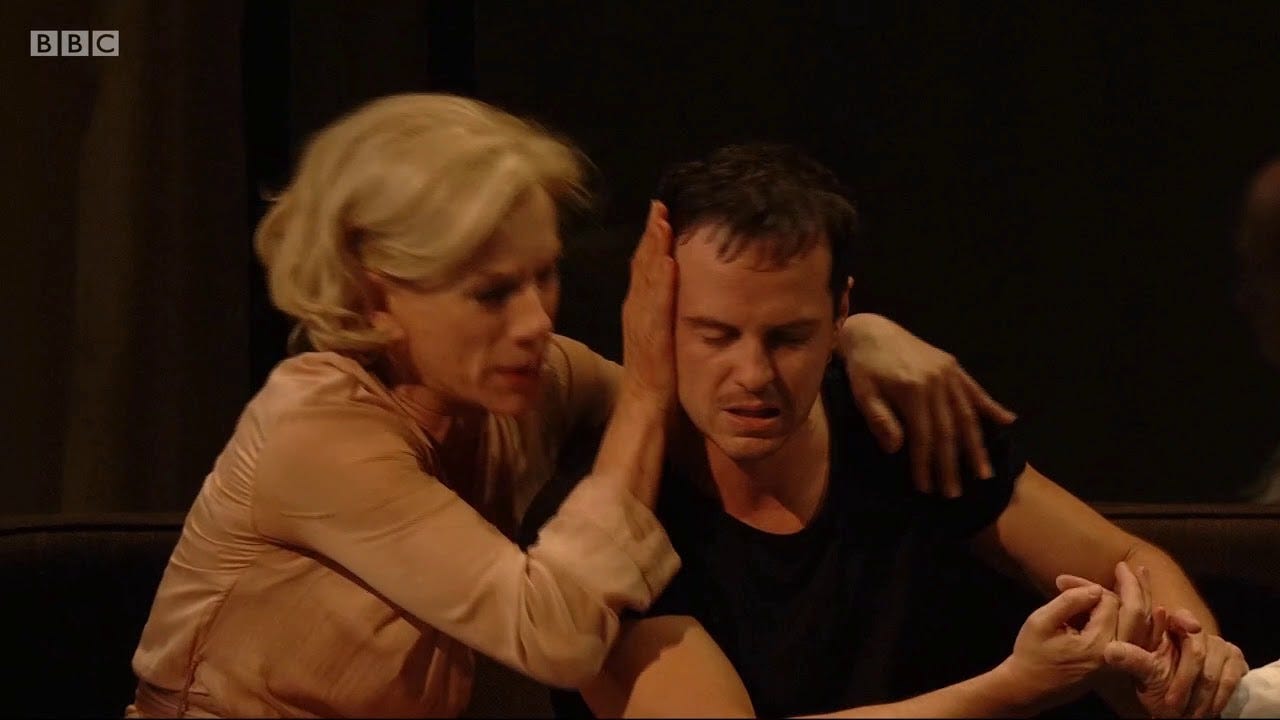Cold Opens on Stage? – The Old King’s Ghost Appears in Hamlet
Horror moments, Shakespeare edition.
‘Horror Moments’ is a light-hearted series examining horror-inflected scenes and themes in unexpected places. The ‘moments’ are published weekly on Thursday mornings, and I share bonus content on the history of magic, theatre, storytelling, and more on Monday afternoons – don’t forget to subscribe!
[Spoilers: Hamlet (1600)]
Counterintuitively, lots of good stories – particularly horror stories – begin with a scene that concerns the least important characters. Something is going to happen to them which will introduce us to the plot proper, and the fact that an audience senses their insignificance, their expendability, is what creates the tension: these are characters who are not safe.
Shakespeare’s Hamlet (1600) opens with a conversation between two guardsmen. If you know the play, do you remember their names?
Most people don’t. Nevertheless, they have a crucial role to play in setting the mood and scene.
Remember that Shakespeare didn’t have access to sophisticated lighting and sound design. Theatres like The Globe were open-roofed and lit by the sun, performances typically took place during the day and in summer when there was more light and the weather was warm. Playhouses didn’t always invest in elaborate set dressing or props, so in the early modern theatre, language bears most of the weight of conjuring a scene.
So what scene does Shakespeare conjure here? Cue our forgettable guardsmen, Bernardo and Francisco.
BERNARDO
'Tis now struck twelve; get thee to bed, Francisco.
FRANCISCO
For this relief much thanks: 'tis bitter cold,
And I am sick at heart.BERNARDO
Have you had quiet guard?
FRANCISCO
Not a mouse stirring.
So it’s midnight, it’s cold, and one guard has come to swap shifts with another. There is also a little foreshadowing here. Why should a guard be ‘sick at heart’? And is there any particular significance to the question ‘have you had quiet guard’ or is this just something Bernardo always says?
Two more men arrive, Marcellus and Horatio. Marcellus asks a tantalising question:
MARCELLUS
What, has this thing appear'd again to-night?
To which Bernardo replies:
BERNARDO
I have seen nothing.
What the hell are they all talking about? What ‘thing’ has been appearing? As the scene unfolds we find out that Marcellus has fetched Horatio because the watchmen under his authority have been seeing something at night, an ‘apparition’ which has refused to speak with them. Horatio is sceptical but the conversation is interrupted by the appearance of the ‘thing’ in question.
When the Royal Shakespeare Company filmed their 2008 production, this moment was shot like a jump scare in a horror film, complete with sudden scary sound.
It’s a moment that ought to make an audience gasp in the theatre too and when staged well it’s genuinely scary.
It always makes me laugh that Marcellus instantly defers to Horatio as if he’s supposed to know what to do because he’s been to university.
MARCELLUS
Thou art a scholar; speak to it, Horatio.
You can practically hear them pushing Horatio forward and cowering behind him.
BERNARDO
Looks it not like the king? mark it, Horatio.
HORATIO
Most like: it harrows me with fear and wonder.
BERNARDO
It would be spoke to.
MARCELLUS
Question it, Horatio.
But whatever the ghost wants, it will not explain itself to these men. Perhaps it will speak to the young prince Hamlet, since it looks like his recently departed father? Is it really the dead man’s spirit, or something that has borrowed his appearance? What does it want? Are its intentions benevolent or sinister? All of these mysteries are set up in this opening scene, but it ends on a cliff-hanger when the spectre vanishes away. Luckily for our lesser characters, this cold open doesn’t end, as they often do, with death.
Naturally, a huge amount has been written about the significance of the ghost (if it even is a ghost) which appears again and speaks to Hamlet at different points in the play. For some, the ghost is always real and always Old Hamlet, the departed king. For others, it is a devilish spirit in disguise, luring Hamlet to commit a terrible crime.
More modern adaptations have explored the idea that the ghost is a manifestation of characters’ psyches. This works really well in a later scene when it appears in Queen Gertrude’s bedchamber but only Hamlet can see it: has the prince now gone completely mad?
In the opening scene this is a harder case to make since everyone sees it at the same time, but some directors have argued that this is in fact a kind of mass hallucination or hysteria brought about by the ‘rotten’ state of political upheaval in Denmark, like a poison in the air.
This was the interpretation favoured by my director Ilona Sell when I was Education Officer for the European Theatre Group tour of Hamlet in 2022, a production which projected shadows against a great white canvass as if we were inside the young prince’s troubled psyche and nothing we saw was fully real.
The grammar of theatrical performance, particularly in Shakespeare’s time, is very different from the grammar of the screen, but one thing you can translate between the two is the power of a frightening cold open. A first scene that reveals little about the protagonists but sets a chilling tone and introduces us to the main threat or mystery of a story has always had the power to glue an audience to their seats.
What are your favourite cold openings in fiction?
Next week things get gory again as we encounter another Shakespearean father who meets an unfortunate fate but for now, happy nightmares everyone!
Horror moments are posted every Thursday and a wide variety of articles exploring the history of magic, theatre, storytelling, and more are published on Monday afternoons.









Always fascinated by Shakespeare ghosts in performance. Hamlet Sr is a weird one too, because it skirts the "it's all in his head" stuff typically used in productions of Macbeth (I think Banquo turns up in the Patrick Stewart BBC one, but it's less effective than McKellen going off his nut and drooling). The Nicol Williamson and Richard Burton Hamlets had just lights (and Gielgud's mellifluous voice in the latter). And if I remember correctly, the Olivier Hamlet Sr was Olivier's voice? But that might have been peak Freudian Hamlet era ...
I would not have remembered Bernardo and Francisco! Though - for me - and interesting side aspect of Hamlet is the subplots with trivial characters (Rozenkranz and Guildenstern most famously).
But, more on topic, there is a lot of what we'd call horror is Shakespeare. The supernatural wasn't cut off from daily life then as it is now (though philosophers like Horatio may have tried to do so). The witches in Macbeth are quite terrifying. Hamlet's ghost is both terrifying and pitiable - I, at least, believe the ghost is real... Though the greatest horror, in my view, is the human stupidity of Lear - and the human brutality that occurs as a result.
I need to re-read the Hamlet - and others.
Thanks for a very interesting piece - you do make me think about things is a new way.